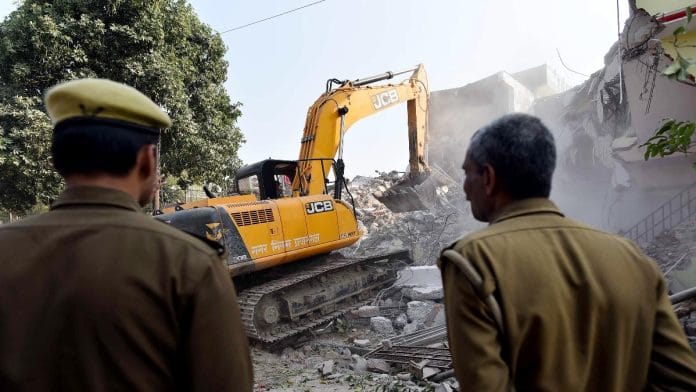New Delhi: In August 2019, one morning, a munadi (service of notice by beating of drum) was given to the residents of a locality in Uttar Pradesh’s Maharajganj that their alleged illegal structures needed to be demolished for a road widening project. On 13 September of the same year, at 3.30 pm, a bulldozer arrived, accompanied by police and state officials, to demolish nearly 80 percent of journalist Manoj Tibrewal Aakash’s ancestral home. It was alleged that the two-storey house, built in 1960, was encroaching on the proposed road.
“We had a shop on the ground floor. They came and razed everything,” Tibrewal told ThePrint, adding that his parents, his brother and his wife were given no time to remove their belongings before the destruction began. “My brother’s wife was heating milk. She was not allowed to even turn off the gas.”
On 6 November this year—5 years after the demolition action—the Supreme Court came down heavily on the Uttar Pradesh government, noting that while the property had encroached by only 3.7 metres, the authorities had demolished between 8 to 10 metres beyond that. It also directed the state government to pay an interim compensation of Rs 25 lakh to Tibrewal, noting that the conduct of the state authorities was “without the authority of law”.
“This is completely high-handed. Where is the due process followed? We have the affidavit that says no notice was issued. You only went to the site and informed the people through a loudspeaker,” Chief Justice of India D.Y. Chandrachud said.
The Supreme Court stated that, procedurally, a notice should be served to the party whose property is accused of illegal encroachment, giving them sufficient time to respond and take appropriate action. However, in Tibrewal’s case, this process was not followed.
The demolition & pursuit of justice
Speaking to ThePrint, Tibrewal said that the first munadi was issued in June 2019. Following this, his mother, Lakshmi Devi Tibrewal, in whose name the house was registered, wrote a letter to the district magistrate on 4 July, 2019. However, Tibrewal said, they got no response.
“They only gave a receipt. My mother requested that the authorities not demolish the house and told them that if they want to remove it, they should give us compensation. There was no response on this. The second munadi came in August, and a few weeks later, on 13 September, the house was demolished,” Tibrewal said.
Right after the incident, Tibrewal knocked on the doors of the National Human Rights Commission (NHRC) and the Supreme Court in October.
In a 6 July, 2020, order, the NHRC stated that Tibrewal’s mother had submitted written complaints to the concerned authorities, but “no authority paid attention to the complainant’s claim/grievances”. ThePrint has accessed the NHRC order.
“No written notice and compensation were given to any residents of the area before demolishing their properties. The district authorities failed to provide any documents which can prove that the govt. land/width of the road in front of the house of the complainant was 32 metres,” NHRC said, noting that this was a prima facie case of “violation of human rights of the complainant and his family members”.
Apart from recommending that Rs 5 lakh be paid to the complainant and an FIR be lodged in the matter, it also directed the Chief Secretary of UP government to take punitive action against the “errant officials” of district administration and police who “dispossessed the complainant from his house without issuing notice in advance”, without providing any monetary compensation and for not following the due process of law while acquiring any property for government use.
On 4 October, 2019, Tibrewal had also written a complaint letter to the Secretary General of the Supreme Court of India, after which a suo motu writ petition was registered in 2020.
It was while hearing this petition that the SC rapped the UP government and ordered Rs 25 lakh as compensation.
Giving the order, the bench also laid down directives to be followed in road widening projects. These include determining the existing width of the road based on older records and surveys, issuing notices, hearing objections to the notices, and, if objections are rejected, serving a notice with reasons. Additionally, the bench mandated that state authorities take legal steps to acquire land in accordance with the law.
“This is an interim compensation that the Supreme Court has granted to the petitioner. He can always approach the district court for more compensation. The UP administration has, till date, not paid the Rs 5 lakh that the NHRC had directed them to pay,” said advocate Shubham Kulshrestha who represented Tibrewal.
Tibrewal plans to do just that. He believes the house is worth at least Rs 5 crore, given its prime location.
“When the munadi came, it was announced on the loudspeaker that if people don’t bring down their own houses, they will have to pay for the bulldozer cost as well. Demarcations of 123 houses were identified on the road map. People started bringing down their own homes, but I stood my ground which is why they wanted to teach me a lesson,” Tibrewal claimed.
(Edited by Zinnia Ray Chaudhuri)
Also read: Stone-pelting accused’s bungalow razed in MP’s Chhatarpur. Routine anti-encroachment, says collector






